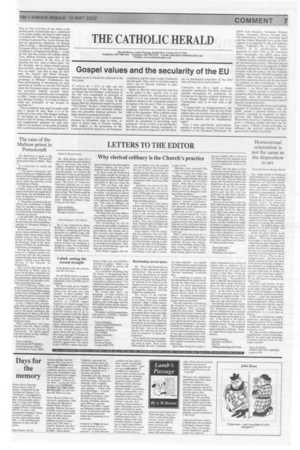Page 7, 10th May 2002
Page 7

Report an error
Noticed an error on this page?If you've noticed an error in this article please click here to report it.
Tags
Share
Related articles
From Fr Bryan Storey Sir – In The Light Of
Loneliness Taken Against The Ibo Peoples Miss Out Total...
A Precious Jewel
Former Anglicans Are Not Rising Up To Campaign For...
From Fr Bryan Storey Sir – The Opposition To Mandatory...
Why clerical celibacy is the Church's practice
From Fr Bryan Storey Sir, Mary Kenny (April 26) is concerned about human loneliness and so advocates the end of celibacy. However ,this will intensify the problem. Many lonely married people will confirm the truth that it's only by giving much more time exclusively to God that loneliness can be radically lessened. The great St Augustine famously pointed out so many centuries ago that the human heart never ceases to be restless until it rests in God. The Church would be most unwise to turn its back on this insight. We need very many more dedicated celibate clergy living out this truth.
Yours faithfully, BRYAN STOREY, Tintagel Catholic Church From Professor T.E.J.Healy Sir, I was surprised by Mary Kenny's conclusion, in spite of the Pope's continuing and strong insistence on a celibate clergy ,that she has joined the ranks of those who would oppose Peter.
Both Mary Kenny and Archbishop O'Brien are paddling in dangerous water. The archbishop should be a teacher of the faith; instead he theorizes: "there is no great theological argument against celibacy ending, nor any great problem with it ending at all...." .
By these words the Archbishop gave great scandal by giving an opportunity to those who gain by criticising the Church which Jesus identified as His own when He said "Thou art Peter and upon this rock I will build My Church".
He gave scandal because, as The Scotsman was pleased to inform its readers, the Pope had only just expressed a quite different view in his address to the Nigerian bishops: "The value of celibacy", he said, "as a complete gift of self to the Lord and His Church must be carefully safeguarded".
The Pope also said that celibacy was central to the life of a priest and they (the priests) should avoid "scandalous behaviour".
The Archbishop by his ill conceived and public comments endangered and insulted those good priests who remain true to their promise and struggle with the natural inclinations of their bodies. They need his support and not to be told that their lives have no theological justification. They must not be told that they gave up marriage unnecessarily.
Mary Kenny suggests that the rule of celibacy was only enacted in 1139, however the Council of Elvira (c 305) confirmed the ancient practice that, even if previously married, deacons, priests and bishops must live in total continence after receiving Holy Orders.
Attention was drawn by His Holiness Pope Pius XI in his encyclical Ad Catholica Sacerdotii (1936) that the conclusions reached at Elvira in respect of ecclesiastical celibacy confirmed long standing practice.
It is most likely that many priests and bishops, including, as we know, St Peter had been married but, on being called by Jesus to his service, they were expected to maintain continence with their wives, ie love them as sisters. This was confirmed by Jesus Himself after St Peter had said to him " We have left our homes and followed you" Jesus replied, with the clarity and the authority that was His alone, "I solemnly assure you, there is no man who has left house or wife or brothers, parents or children, for the sake of the Kingdom of God, who will not receive plentiful return in this age and life everlasting in the age to come" (Luke 18:29).
Matthew also reported His words (19:10) on this subject: "Not everyone can accept this teaching and some there are who have freely renounced sexual relations for the sake of God's reign". With these words Our Blessed Lord declared the discipline of clerical celibacy; a law which cannot be changed to meet prevailing weakness.
The Council of Carthage (c390) referring to the need for clerics to observe "perfect continence" added "What the apostles, taught and antiquity itself observed let us endeavour to keep" Marriage is not simply sex within a moral framework. It is a life commitment of work and worry full time. Could a priest be a priest and give his whole life to God and yet be a full time earthly father and husband able to support a family through each crisis and at every age?
What would the priest do, if called very urgently and unexpectedly to a parishioner who had suddenly become very dangerously ill and probably dying, while baby sitting a sick baby in the temporary absence of his wife? Mary Kenny argues that families are now smaller. She is correct in this belief but this depends more on contraception and abortion than on an evolutionary trend or on abstinence.
Priests take the place of Our Lord at the consecration and when administering the sacraments. He, Our God, though He blessed the married state, did not Himself marry. He was the first priest, the High Priest. It was He who set the standard. He by His example showed the way for His "true" priests and was His wish not reflected by His Holy Mother Who, though married, embraced perpetual virginity?
Are we not to believe that the Holy Spirit dwells continually and forever with the Church and at its side? (John 14,15-18). Has the Holy Spirit been absent all these years? Rather than peddling the fashionable solutions of a hedonistic and godless society, Mary Kenny and the Archbishop might do better to support our priests by reminding them that their celibacy, undertaken and maintained at no little cost to themselves in accordance with the Divine will and in imitation of their Saviour, validates their priesthood and should be their proudest boast.
Yours Sincerely, T.E.J. HEALY, Westfield, East Sussex
blog comments powered by Disqus













